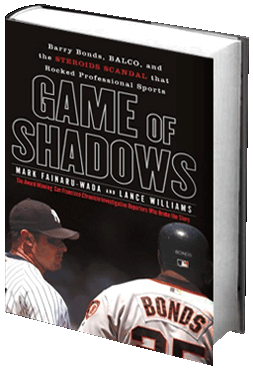
Marion Lois Jones, also known as Marion Jones-Thompson, is an American former world champion track-and-field athlete and former professional basketball player. She won three gold medals and two bronze medals at the 2000 Summer Olympics in Sydney, Australia, but was later stripped of her medals after admitting to steroid use.

Tetrahydrogestrinone (THG), known by the nickname The Clear, is a synthetic and orally active anabolic–androgenic steroid (AAS) which was never marketed for medical use. It was developed by Patrick Arnold and was used by a number of high-profile athletes such as Marion Jones, Barry Bonds, and Dwain Chambers.
The Bay Area Laboratory Co-operative (BALCO) was an American company that operated from 1983 to 2003 led by founder and owner Victor Conte.
Christos Tzekos is a Greek athletics coach.
Victor Conte Jr. is the founder and president of Bay Area Laboratory Co-operative (BALCO), which is now defunct. BALCO was a sports nutrition center in California. In the late seventies Conte played bass with funk / R&B group Tower of Power, appearing on the band's 1978 release We Came to Play!.
Greg F. Anderson is an American personal trainer, best known for his work with baseball player Barry Bonds, and links with BALCO.

Game of Shadows: Barry Bonds, BALCO, and the Steroids Scandal that Rocked Professional Sports is a bestselling non-fiction book published on March 23, 2006, and written by Mark Fainaru-Wada and Lance Williams, reporters for the San Francisco Chronicle. When Sports Illustrated released excerpts from the book on March 7, it generated considerable publicity because the book chronicles alleged extensive use of performance-enhancing drugs, including several different types of steroids and growth hormones, by San Francisco Giants outfielder Barry Bonds.
"The cream" is a testosterone-based ointment that is used in conjunction with anabolic steroids such as tetrahydrogestrinone in order to mask doping in professional athletes.
Lance Williams and Mark Fainaru-Wada co-authored the book Game of Shadows while they were reporters for the San Francisco Chronicle. For their investigative work in the field of steroids, Williams and Fainaru-Wada were given the 2004 George Polk Award.
Doping in baseball has been an ongoing issue for Major League Baseball (MLB). After repeated use by some of the most successful professional baseball players in MLB history, these banned substances found their way to the collegiate level. At the junior college level, due to lack of funding and NCAA drug testing, the abuse of PEDs is most common, but they are also an issue in Division I, II and III.
Trevor Graham is a Jamaican-born American former sprinter and athletics coach. Following the BALCO scandal, the US Olympic Committee barred him indefinitely from all its training sites.
Performance-enhancing substances, also known as performance-enhancing drugs (PEDs), are substances that are used to improve any form of activity performance in humans. A well-known example of cheating in sports involves doping in sport, where banned physical performance-enhancing drugs are used by athletes and bodybuilders. Athletic performance-enhancing substances are sometimes referred as ergogenic aids. Cognitive performance-enhancing drugs, commonly called nootropics, are sometimes used by students to improve academic performance. Performance-enhancing substances are also used by military personnel to enhance combat performance.
Patrick Arnold is an American organic chemist known for introducing androstenedione, 1-androstenediol, and methylhexanamine into the dietary supplement market, and for creating the designer steroid tetrahydrogestrinone, also known as THG and "the clear". THG, along with two other anabolic steroids that Arnold manufactured, not banned at the time of their creation, were hard-to-detect drugs at the heart of the BALCO professional sports doping scandal. BALCO distributed these worldwide to world-class athletes in a wide variety of sports ranging from track and field to professional baseball and football.

Norboletone, or norbolethone, is a synthetic and orally active anabolic–androgenic steroid (AAS) which was never marketed. It was first developed in 1966 by Wyeth Laboratories and was investigated for use as an agent to encourage weight gain and for the treatment of short stature, but was never marketed commercially because of fears that it might be toxic. It subsequently showed up in urine tests on athletes in competition in the early 2000s.

Desoxymethyltestosterone (DMT), known by the nicknames Madol and Pheraplex, is a synthetic and orally active anabolic–androgenic steroid (AAS) and a 17α-methylated derivative of dihydrotestosterone (DHT) which was never marketed for medical use. It was one of the first designer steroids to be marketed as a performance-enhancing drug to athletes and bodybuilders.
The Barry Bonds perjury case was a case of alleged perjury regarding use of anabolic steroids by former San Francisco Giants outfielder and all-time Major League Baseball (MLB) career home run leader, Barry Bonds, and the related investigations surrounding these accusations. On April 13, 2011, Bonds was convicted of one felony count of obstruction of justice for giving an incomplete answer to a question in grand jury testimony. A mistrial was declared on the remaining three counts of perjury, and those charges were dropped. The obstruction of justice conviction was upheld by an appellate panel in 2013, but a larger panel of the appellate court overturned the conviction in 2015.
Jeff Novitzky is the current Senior Vice President of Athlete Health and Performance for the UFC, the world's largest mixed martial arts (MMA) promotion. He previously served as a special agent for the Food and Drug Administration, investigating the use of steroids in professional sports. Before April 2008 he was a special agent for the Internal Revenue Service who investigated the use of steroids for over five years. Novitzky's work has been credited with "changing the face of sports."
The use of anabolic steroids and performance-enhancing drugs in American football is officially prohibited by virtually every sanctioning body.
Since their discovery, anabolic steroids (AAS) have been widely used as performance-enhancing drugs to improve performance in sports, to improve one's physical appearance, as self-medication to recover from injury, and as an anti-aging aid. Use of anabolic steroids for purposes other than treating medical conditions is controversial and, in some cases, illegal. Major sports organizations have moved to ban the use of anabolic steroids. There is a wide range of health concerns for users. Legislation in many countries restricts and criminalizes AAS possession and trade.
Tammy Thomas is an American former sprint track cyclist, who won a silver medal at the 2001 UCI Track Cycling World Championships in the individual sprint event. However, her career was ended after she was caught using anabolic steroids.





